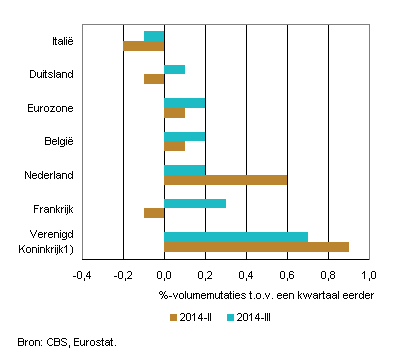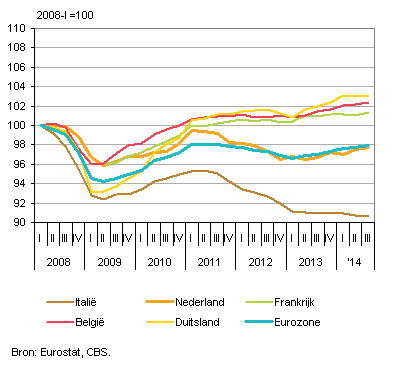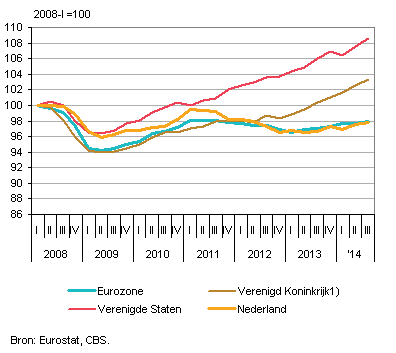
Modest economic growth in the euro area
The economies of the Eurozone and the European Union grew by 0.2 and 0.3 percent, respectively, in the third quarter of 2014 compared to the previous quarter. Compared to the previous year, the euro area economy grew by 0.8 percent and the European Union economy by 1.3 percent. This is clear from the numbers Eurostat Announced this morning. Earlier today, CBS announced that the Dutch economy grew by 0.2 percent in the third quarter compared to the previous quarter and 1.1 percent compared to the previous year. In recent years, the development of the Dutch economy has been in line with the growth of the euro area.
GDP of European countries and the Eurozone
There is no recovery yet in Italy and Cyprus
With the exception of Italy and Cyprus, the economies of all eurozone countries recorded growth in the third quarter. In Italy, the economy contracted by 0.2 and 0.1% respectively in the second and third quarters, after zero growth in the first quarter. The Italian economy contracted sharply in 2012 in particular. After that, the shrinkage was less noticeable, but still no growth. Cyprus has witnessed a sharp contraction over the past four quarters.
Germany and France are growing again
In Germany, the largest economy in the euro zone, the economy grew by 0.1 percent compared to the previous quarter, after a slight contraction in the second quarter. The current growth of the German economy is mainly due to increased household spending and export growth. Investments in Germany decreased, especially in construction.
France, the euro zone’s second-largest economy, fared slightly better with growth of 0.3 percent in the third quarter. In the second quarter, the French economy contracted by 0.1 percent, and even before that, the French economy barely grew. Industrial production in particular performed well last quarter.
Stable growth in Spain, Portugal, Belgium and Greece
The Spanish economy has grown in all quarters of 2014 so far; In the third quarter, by 0.5 percent. The Greek economy also grew in the first three quarters of 2014. The Portuguese economy grew strongly since the second quarter of 2013, but contracted in the first quarter of 2014 before growing again in the second and third quarters. There is modest but stable growth in Belgium.
Developing the GDP of European countries and the Eurozone
The Dutch economy is still below its 2008 level
The Dutch economy and the eurozone economy are still below the level they were in early 2008; Both were still 2 percent lower in the third quarter of 2014. For a while, the Dutch economy performed better than the eurozone economy, but not anymore since 2011. Since mid-2012, the Netherlands and the eurozone economies have been grows at the same time. The German economy, which has great weight in the Eurozone, has seen a strong recovery since the beginning of 2010. But after 2010, German growth also weakened. But on average the German economy has performed the best ever in the eurozone since the beginning of 2008.
Strong growth in the British economy and further recovery in the United States
Outside the eurozone, the UK economy grew by 0.7% in the third quarter. The economy actually grew by 0.9 percent in the second quarter. The British economy has been going through a period of strong recovery for more than a year. The recovery in the United States, the world’s largest economy, also continued in the third quarter, with a growth of 0.9 percent compared to the previous quarter. The US economy actually grew by 1.1 percent in the second quarter. The US economy contracted in the first quarter, but this was mainly due to an exceptionally harsh winter. Compared to these Anglo-Saxon countries, the Netherlands and the eurozone as a whole have performed very poorly. It is clear that the US economy is emerging from the crisis. GDP in the third quarter was 8 per cent above the 2008 level. The British economy is now well above the level it was in early 2008.
GDP outside Europe
For the purposes of international comparison, all figures in this article have been adjusted for working days and seasons. United Kingdom, indicated by the number 1) The working day is not modified.

“Travel enthusiast. Alcohol lover. Friendly entrepreneur. Coffeeaholic. Award-winning writer.”



